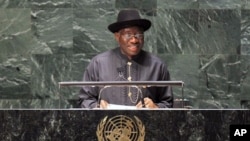Nigerian President Goodluck Jonathan says fighting corruption is one of the driving goals of his new administration.
President Jonathan says the fight against corruption "must enlist the overwhelming force of Nigeria's collective determination" to ensure that the country's limited resources are best used for the common good.
As the president assembles his new cabinet, Nigeria's Securities and Exchange Commission is working with business leaders to enforce a revised Code of Corporate Governance to curb corruption and make Nigerian firms more competitive.
The commission's director general, Arunma Otteh, says that will attract more outside investment. "We believe that it is important from the individual company point of view, from a competitiveness point of view to be able to attract investors both local and international. They will have comfort when they know that the company is abiding by the best practice in terms of corporate governance. We also feel that it is a competitive tool for Nigeria as a whole, as we seek as a nation to improve the competitiveness of our country, and ensuring the flagship companies, companies listed on our exchange, are abiding by best practice for us is key," he said.
The managing directors of eight Nigerian banks were last year charged with fraud over illegal loans that threatened to collapse the banking sector and necessitated a $4 billion bailout by the Central Bank.
Otteh says the revised code holds corporate leaders responsible for their conduct. "The companies also have to declare the extent of their compliance to the code and that means there are liabilities for directors for misrepresentations. So in a sense while it is voluntary, there is a mechanism for us to reinforce good corporate governance practice. So it is actually the best of both worlds," he said. "Because when people own an initiative, they tend to take responsibility for that."
Attorney Michael Ellah says the breadth of corruption in Nigeria limits outside investment.
"Because of in many areas of this economy there is a lot of corruption as we all know, so we need to find a way to block this from the corporate culture," Ellah noted.
Harm Ploeger is the finance director for the West Africa branch of the British engineering and construction firm Costain. He says the cost of doing business in a corrupt economy far outweighs what companies will spend to demonstrate their compliance with the new code of conduct.
"[You] can not make the profits sustainably, which means over a large number of years if you do not have any form of corporate governance, I think in the end corporate governance rather keeps you in business than you must see it as a cost," Ploeger stated.
The Nigerian Stock Exchange is also working to reform trading and listing practices after a 60 percent drop in the main stock index between 2008 and 2009. Foreign investment on the exchange last year nearly doubled to more than $2 billion.
Nigeria Government Fighting Corporate Corruption
